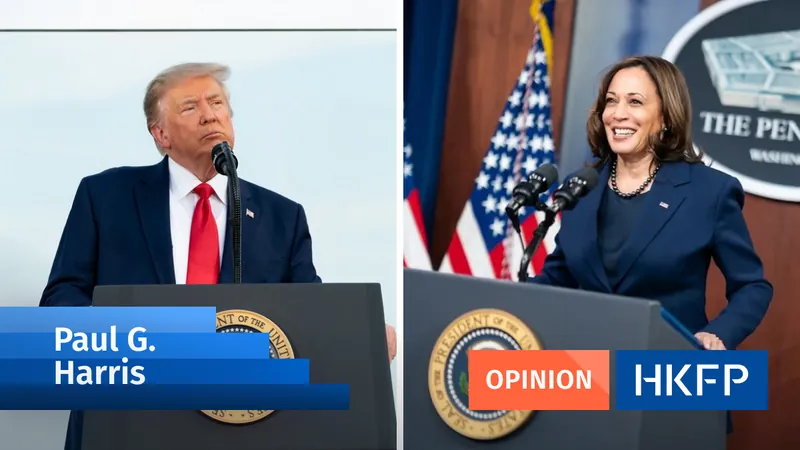
American Expats in Hong Kong: A Potential Game-Changer for the 2024 U.S. Elections
2024-09-29
As the United States gears up for the national elections on November 5, the stakes couldn’t be higher. Will Democratic Vice President Kamala Harris prevail, or will former Republican President Donald Trump make a comeback? The outcome could determine not only the future trajectory of U.S. policy but also its standing in a rapidly changing global landscape.
One of the lesser-known factors in this high-stakes election is the role of American expatriates living in Hong Kong. This group, numbering around 70,000, has the power to sway the electoral landscape. With 15,000 Americans having relocated from the region in the past few years—largely due to the COVID-19 pandemic and new national security laws—those who remain could play a pivotal role in determining which party retains power in Washington.
Historically, participation in elections among American expats is low; fewer than 10% tend to vote. Challenges abound, including the age demographics of residents and a general apathy toward civic duty. Yet, it would be a mistake to underestimate their potential impact. Recent elections have shown how razor-thin margins can dictate presidential outcomes. The 2000 election, which saw George W. Bush triumph over Al Gore, exemplifies this truth—a few hundred votes in Florida swung the election, despite Bush receiving fewer votes nationwide.
The Electoral College system complicates matters further, as it disproportionately empowers smaller states, making swing states the ultimate battlegrounds. States like Michigan, Pennsylvania, and Wisconsin hold the keys to victory, with both candidates needing to claim their Electoral College votes.
Currently, around 1.6 million Americans from these crucial swing states are residing abroad, and their votes could be decisive. The procedure for voting from overseas has been simplified, allowing expats to register by sending a federal form to their last state of residence. Organizations such as votefromabroad.org provide comprehensive guidance to help ensure that ballots make it back to polling places on time.
American expats in Hong Kong must navigate some complexities if they wish their voices to be heard. Given the possible influence of their votes, urgency in adhering to voting guidelines is paramount—especially in Republican-controlled jurisdictions where absentee ballot counting is being restricted.
Now, the question arises: who should these expatriates vote for? While patriotism may serve as a guiding principle, it also presents a moral dilemma. Supporting a candidate who effectively advances long-term national interests, national defense, and economic prosperity can also mean considering the global implications of those choices.
For many expatriates, Kamala Harris emerges as a preferable candidate. Following the footsteps of President Biden, her policies are likely to focus on economic growth, worker rights, and international cooperation—specifically in addressing challenges like the Russian-Ukraine conflict. Harris aims for a rational national security framework while advocating for a greener future—an intention that contrasts sharply with Trump’s previous term, which many critics argue severely undermined environmental protections.
On the other hand, voting for Trump could lead to disastrous consequences. If elected, his agenda could trigger economic turmoil, increase national debt, and bolster adversarial relationships internationally, all while threatening the essence of democracy in the U.S. through aggressive measures against voting rights and minority protections.
Moreover, expats who identify as "Chinese patriots" might face an internal conflict when choosing a candidate. In the context of Hong Kong, such patriotism often requires allegiance to the Chinese Communist Party (CCP). Ironically, while Harris may oppose the CCP, her approach could actually foster a more stable and prosperous relationship with China for its citizenry—an outcome that could resonate with many in the expat community.
In conclusion, the ability of American expats in Hong Kong to influence the upcoming elections is significant. As they prepare to cast their votes, they must weigh their options carefully. A vote for Harris may represent not just a commitment to American values, but also a more nuanced understanding of how U.S. leadership intersects with global dynamics. The choice between supporting a stable, prosperous future and risking global power shifts could very well be in their hands.
This election could be a turning point, and the voices of those living abroad could echo through the halls of American power for years to come. Have your say—make it count!


 Brasil (PT)
Brasil (PT)
 Canada (EN)
Canada (EN)
 Chile (ES)
Chile (ES)
 España (ES)
España (ES)
 France (FR)
France (FR)
 Hong Kong (EN)
Hong Kong (EN)
 Italia (IT)
Italia (IT)
 日本 (JA)
日本 (JA)
 Magyarország (HU)
Magyarország (HU)
 Norge (NO)
Norge (NO)
 Polska (PL)
Polska (PL)
 Schweiz (DE)
Schweiz (DE)
 Singapore (EN)
Singapore (EN)
 Sverige (SV)
Sverige (SV)
 Suomi (FI)
Suomi (FI)
 Türkiye (TR)
Türkiye (TR)